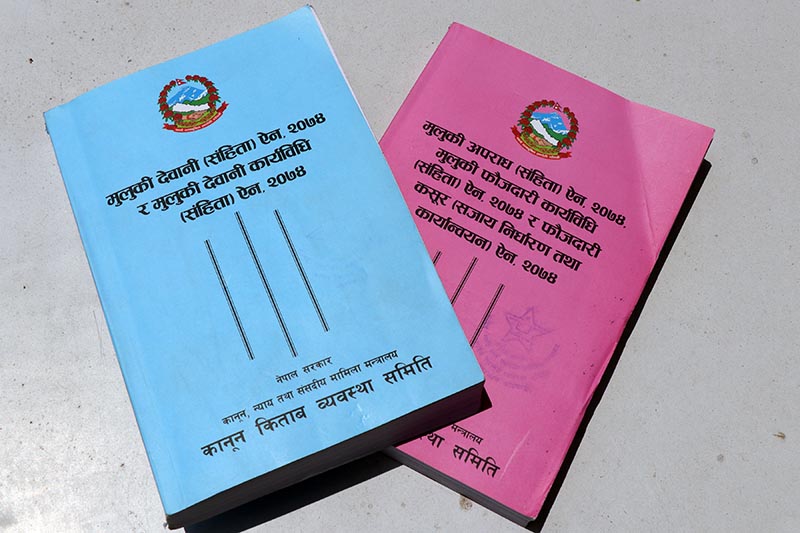Ignored, ergo ignorant: Without intervention, the plight continues
The responsibility of disseminating legal information and promoting legal awareness primarily lies with the government. The concerned authorities must take active measures to create awareness among citizens about the laws, procedures and remedies for seeking justice and also make arrangements to provide sufficient legal aid and resources to the needful
According to the legal maxim ‘ignorantia juris non-excusat’, meaning ‘ignorance of the law is no excuse’, one cannot escape liability for violating a law merely because one was unaware of the law and its content. Likewise, after a law is promulgated, it is presumed that everyone is aware of that law. Also, it is expected that citizens are familiar with their rights and can approach the concerned institution upon violation.
In Nepal, due to various socio-economic, cultural and geographical reasons, marginalised populations remain unaware of their rights. As a result, they cannot assert their rights and seek redressal. This lack of legal literacy continues to put them in a disadvantageous position.
A few days back, I met a 26-year-old woman. Her family married her off at the age of 14, and a year later, she gave birth to her first daughter. By the age of 22, she had given birth to three children from her first husband.
Being a child bride, at an early age, she started bearing the burden and responsibilities of a wife and became a mother, but because of not being of the minimum legal age for marriage, her marriage was registered much later. As per the Marriage Registration Act, the minimum legal age of marriage in Nepal is 20 years and 18 years with parental consent.
According to her, shortly after the birth of the third child, who is around 5 years, her first husband ran away with another woman to another country, then, not knowing what to do, she decided to marry another man.
In her second marriage, she lied about her caste to her husband. Upon learning she came from a Dalit community, she had to live separately on the premises of their home while taking care of her husband, who succumbed to cancer a few months back.
She has also given birth to his daughter who is less than a year old. After her husband’s demise, she went to her natal home. But she was abandoned there too. Been left high and dry, she was referred to the shelter home, CASA Nepal.
Her history demonstrates how a female at a tender age became subjected to various forms of gender-based violence and injustice. Child marriage, teenage pregnancy, bigamy, illiteracy, discrimination and abandonment, unaware of her rights.
Because of her lack of legal awareness, she could not take action and claim her rights. ‘I did not know that if the husband brings another woman, you can report to the police. Had I known I would have filed a case, fought for my rights, asked for ansa (property rights)’, she said. ‘Only if you are educated, you know these,’ she added.
Unfortunately, the plight does not end just there. To top it all, she is stateless, i.e., she does not have citizenship.
Before she could acquire citizenship through her first husband, the marriage hit a problem.
Owning to caste discrimination, her second marriage is not registered.
Lack of citizenship challenges security and stability.
Citizenship, the primary legal identity document, is vital. Without it, one cannot obtain a passport, PAN or SIM. Not having it also harms economically as one cannot open a bank account, access formal employment opportunities, start a business, own property or claim allowances.
Ultimately, this limits the freedom and ability to live a dignified life. Furthermore, the possibility of being subjected to abuse and exploitation is high as there is no record of identity. This puts her in a difficult and vulnerable position, and also, might lead her to depend upon someone.
Citizenship and registration documents are also very essential for pursuing legal action. Without these, access to justice becomes challenging. Fortunately, allowance paved way for the birth registration of children from her first marriage.
‘There is a provision of Rs 2,400 yearly grant for a child below five years, and so my husband registered,’ she said. But the birth registration of the child from her second marriage has not been done. In cases of abandonment, obtaining documents becomes problematic, and she might need legal assistance.
According to the law, child marriage is illegal; sex with a minor is considered rape; teenage pregnancy is a violation of girl child’s rights; a bigamist is liable to imprisonment and penalty, and caste and gender-based discrimination is unlawful and against the Constitution. The irony is that the wrongdoers are free, but the one who has been wronged continues to suffer.
Many women in the marginalised community share a similar plight. They experience ‘multiple jeopardy’.
They have been facing inequality and injustice within the family, in the community, outside of their community and also by the actors and agents of the state in numerous forms of discrimination and oppression based on gender, caste and class.
The traditions and customs have been overpowering the law, and women, when seeking justice are weighed down by the legal procedures and technicalities.
Those unaware of fundamentals due to illiteracy are expected to deal with the legal technicalities when accessing justice. In addition to the cost and delay, the complexity and lack of support in the legal system discourages them from access to justice.
The responsibility of disseminating legal information and promoting legal awareness primarily lies with the government.
The concerned authorities must take active measures to create awareness among citizens about the laws, procedures and remedies for seeking justice and also make arrangements to provide sufficient legal aid and resources to the needful. These women require and should get legal advice, assistance, constant support and resources to resolve their legal problems. Without intervention, these women are bound to remain trapped in this vicious circle born out of inequality.






